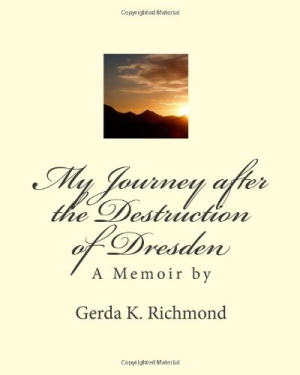My Journey after the Destruction of Dresden
Without question, Gerda Richmond is a survivor. Born in Dresden in 1934, Richmond grew up under Nazi rule. She endured the shortages and difficulties suffered by the average German citizen from around the time of Hitler’s rise through the end of World War II, and then beyond into the days of the Soviet occupation of East Germany. It was not until 1957 that she was able to fulfill a long-held dream and escape to West Germany. Finally, late in 1961, she managed to obtain the necessary permission to emigrate to the United States.
My Journey after the Destruction of Dresden is Richmond’s story of the trials she faced in both East and West Germany and the life she forged in her new country. Personal, detailed, and engrossing, her memoir explores the triumph of her own American Dream over the insecurity and mistrust rampant in her youth.
That Richmond overcomes such difficult early years and still maintains the fortitude to change her life speaks to her strength of character. She is headstrong and not always wise in her decisions, but she refuses to be beaten down by anything that comes her way. Her life in America is not perfect, but she falls back on what she calls the “disaster-conditioning” of her youth in order to move forward. “My turbulent past has taught me tremendous appreciation for the here and now,” she says, and her biggest triumph is having obtained the right “to feel free to do things [her] way.” Richmond’s attitude itself is inspiring.
Unfortunately, much of My Journey after the Destruction of Dresden is marred by improper word choice and uncomfortable phrasing. Undoubtedly because English is not Richmond’s native language, much of the diction is awkward. From phrases like “a dozen of eggs” to “I wanted to put up house,” certain wording is jarring. Many phrases include the wrong preposition, and, at points, it is impossible to tell whether the use of incorrect words like “padded” for “patted,” “cloves” for “gloves,” and “graved” for “craved” represent poor word choice or simply typographical errors. Oddly, some of these errors are almost endearing, as if a friend who is not a native English speaker is telling the story.
My Journey after the Destruction of Dresden is a wonderful tale, but it would benefit from a sympathetic editor who could clean up the text while keeping Richmond’s voice intact.
Reviewed by
Cheryl Hibbard
Disclosure: This article is not an endorsement, but a review. The publisher of this book provided free copies of the book and paid a small fee to have their book reviewed by a professional reviewer. Foreword Reviews and Clarion Reviews make no guarantee that the publisher will receive a positive review. Foreword Magazine, Inc. is disclosing this in accordance with the Federal Trade Commission’s 16 CFR, Part 255.

